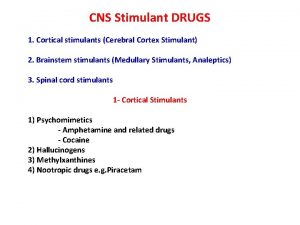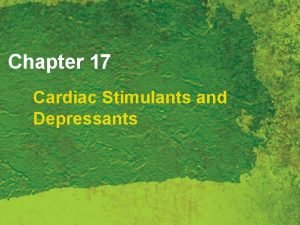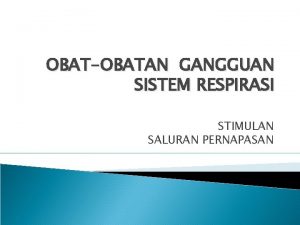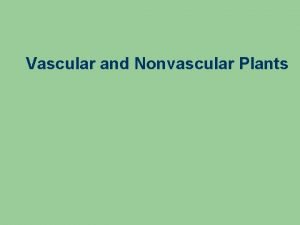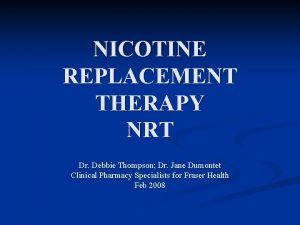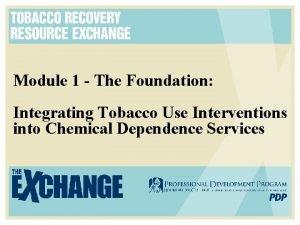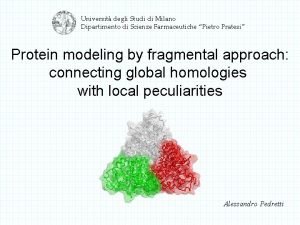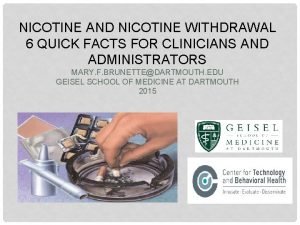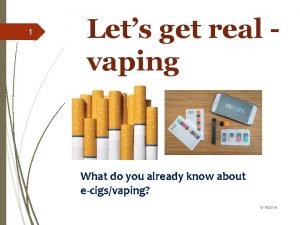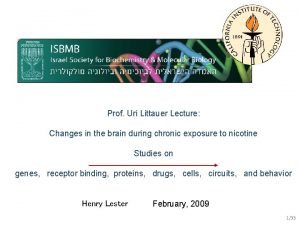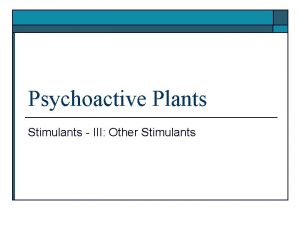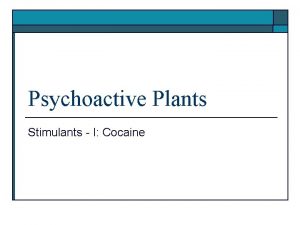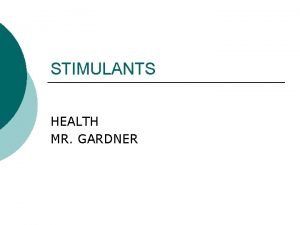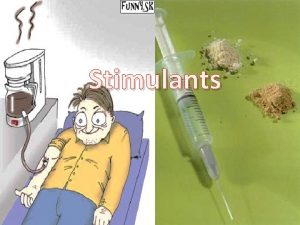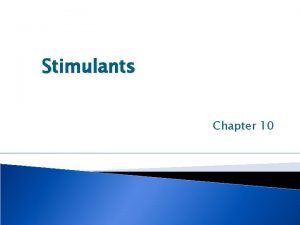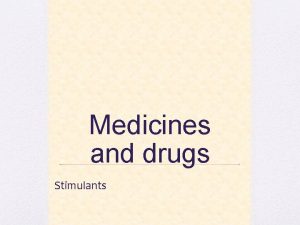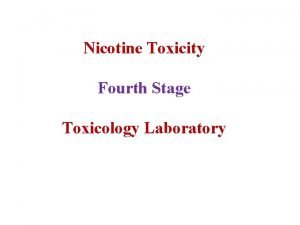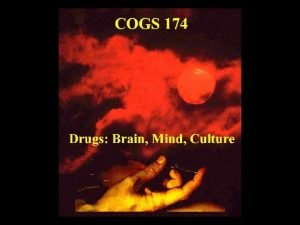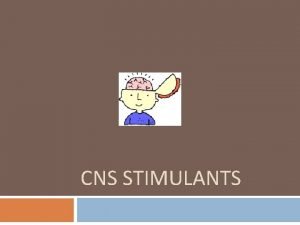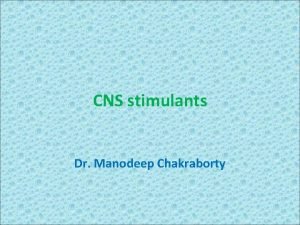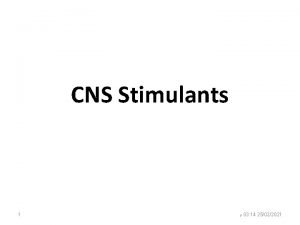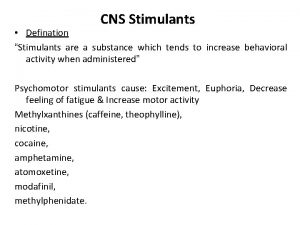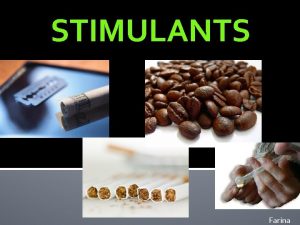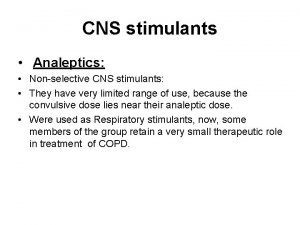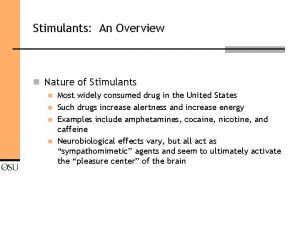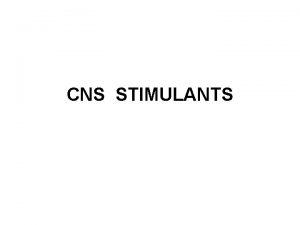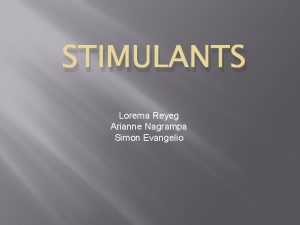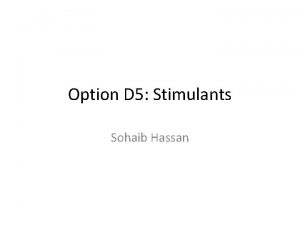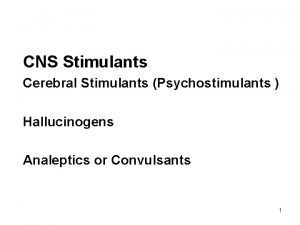Psychoactive Plants Stimulants II Nicotine Nicotine o Major




























- Slides: 28

Psychoactive Plants Stimulants - II: Nicotine

Nicotine o Major alkaloid in the genus Nicotiana n n Nicotiana, a large genus mainly from New World (~ 65 species) in the Solanaceae Cultivated species: N. tabacum & N. rustica

Nicotiana tabacum

Tobacco history o o New World usage 1492 – Columbus Introduction to Europe British colonies

Nicotine o o o Major alkaloid First isolated early in 19 th century Synthesized in roots of tobacco plant and translocated to the leaves One of the most toxic plant poisons In pure form, nicotine is deadly, causing death by respiratory paralysis Nicotine is the most addictive drug in widespread use

Nicotine

Nicotine insecticides o o o Effective against most all types of insect pests, but is used particularly for aphids and caterpillars - soft bodied insects Mimics acetylcholine at the neuromuscular (nerve/muscle) junction and results in twitching, convulsions, and death Same action is observed in all insects

Nicotine effects and mode of action o o Acts as a CNS stimulant and also affects peripheral nervous system Stimulation of adrenal glands and discharge of epinephrine (adrenaline) Nicotine also suppresses insulin output from the pancreas, which means that smokers are always slightly hyperglycemic In addition, nicotine indirectly causes a release of dopamine in the reward region of brain that controls pleasure and motivation

Mode of action on brain o Nicotine exerts its effects in the brain by acting on a specific type of receptor for acetylcholine, known as the nicotinic receptor o These receptors on dopamine neurons within the ventral tegmental area Activates acetylcholine receptors (locks the channel open) - this increases the activity of these dopamine neurons, leading to an increase in dopamine release in synapse, which is thought to mediate reward o

Nicotinic Receptor o o o Researchers believe the beta 2 subunit of the nicotinic receptor is a critical component in nicotine addiction Mice that lack this molecule fail to self-administer nicotine, implying that without the beta 2 molecule, the mice do not experience the positive reinforcing properties of nicotine This suggests a potential site for targeting the development of anti-nicotine addiction medications

Other Psychoactive Compounds? o o o Research is also beginning to show that nicotine may not be the only psychoactive ingredient in tobacco Cigarette smoking results in a marked decrease in the levels of monoamineoxidase (MAO) in the brain MAO an important enzyme that is responsible for breaking down dopamine. The decrease in two forms of MAO, A and B, results in higher dopamine levels Also a depressant?

Health Risks o o King James I of England in 1604 1948 JAMA n o o “More can be said in behalf of smoking as a form of escape from tension than against it. . ” In 1964 U. S. Surgeon General’s report stated that cigarette smoking linked to lung cancer, heart disease, emphysema, and other conditions Cigarette smoking the number one cause of preventable death

Cigarette smoking leading cause of death in US

Cigarette Smoking o o o Most prevalent form of nicotine addiction Most cigarettes today contain 10 mg or more of nicotine Through inhaling smoke, the average smoker takes in 1 to 2 mg nicotine per cigarette Smoking results in rapid distribution of nicotine throughout the body, reaching the brain in 10 sec Delivery to the brain Other forms of tobacco

Over 438, 000 Annual Deaths in US Due to Cigarette Smoking

Risk of Cancer o o 85% to 90% of all lung cancer is due to cigarette smoking About 1/3 of all cancer cases are due to cigarette smoking n o Smoking associated with cancers of mouth, pharynx, larynx, esophagus, stomach, pancreas, uterine cervix, kidney, ureter, bladder, colon, and leukemia Chewing tobacco strongly linked to oral cancer 50 X increase in risk of oral cancer

Tobacco Smoke o o o Over 4, 700 chemical compounds found in tobacco smoke Several (43) cancer causing substances Several alkaloids in addition to nicotine although nicotine not implicated in cancer there is some evidence that it is converted to a carcinogenic cmpd in the body Tars may be the leading carcinogens in cigarette smoke However, low tar cigarettes do not decrease incidence of smoking related diseases

Cardiovascular Disease o o o Smoking increase risk of cardiovascular disease including stroke, sudden death, heart attack, peripherall vascular disease and aortic aneurism Cigarettes caused almost 180, 000 deaths from cardiovascular disease (1990) Components of smoke also damage lining of blood vessels which can lead to atherosclerosis

Pulmonary Disease o o o Cigarette smoking the leading cause of pulmonary disease In 1999, there were over 82, 000 deaths from pulmonary disease in US – mainly from pneumonia, emphysema, bronchitis In a recent study, maternal cigarette smoking the single most important risk factor in children developing asthma – way ahead of all other risk factors

Passive Smoking o o Smokers not the only ones affected by cigarette smoke Much research has focused on the risks of secondary smoking n n 53, 000 annual deaths in US A non-smoker living with a smoker has a 30% higher risk of death from coronary heart disease and a 30% or higher risk of lung cancer depending on exposure

Smokers o o o 22. 8% of the US population smokes cigarettes Decrease from 25% in 1998 Decrease greater among men than women Women now account for 39% of the smoking related deaths – lung cancer has surpassed breast cancer as leading cause of cancer deaths among women Smoking by teens continues to be a major problem but has actually decreased in the past few years

Tobacco Use in the US, 1900 -2002 Per capita cigarette consumption Male lung cancer death rate Female lung cancer death rate *Age-adjusted to 2000 US standard population. Source: Death rates: US Mortality Public Use Tapes, 1960 -2002, US Mortality Volumes, 1930 -1959, National Center for Health Statistics, Centers for Disease Control and Prevention, 2005. Cigarette consumption: US Department of Agriculture, 1900 -2002.

Trends in Cigarette Smoking Prevalence* (%), by Gender, Adults 18 and Older, US, 1965 -2004 Men Women *Redesign of survey in 1997 may affect trends. Source: National Health Interview Survey, 1965 -2004, National Center for Health Statistics, Centers for Disease Control and Prevention, 2005.

Trends in per capita cigarette consumption for selected states and the average consumption across all states, 1980 -2003 United States Massachusetts California Data from: Orzechowski W, Walker RC. The tax burden on tobacco: historical compilation 2003: Volume 36. Arlington (VA): Orzechowski and Walker; 2003.

Trends in Smoking Among Teens


Current* Cigarette Smoking Prevalence (%), by Gender and Race/Ethnicity, High School Students, US, 1991 -2003 *Smoked cigarettes on one or more of the 30 days preceding the survey. Source: Youth Risk Behavior Surveillance System, 1991, 1995, 1997, 1999, 2001, 2003, National Center for Chronic Disease Prevention and Health Promotion, Centers for Disease Control and Prevention, 2004.

Tobacco Industry o o Legal battles By end of 1998 all 50 states and DC had reached settlements with 5 largest tobacco companies Master Tobacco Settlement which will cost the tobacco companies over $200 billion Federal legislation
 Psychoactive drugs chart
Psychoactive drugs chart Module 25 psychoactive drugs
Module 25 psychoactive drugs Psychoactive drugs definition
Psychoactive drugs definition Cortical stimulants
Cortical stimulants Cardiac stimulants and depressants
Cardiac stimulants and depressants Respiratory stimulants
Respiratory stimulants Oxytocin uses
Oxytocin uses Classify flowering and nonflowering plants
Classify flowering and nonflowering plants C3 plant
C3 plant How does moss reproduce
How does moss reproduce Non vascular vs vascular plants
Non vascular vs vascular plants Nicotine look like
Nicotine look like Nicotine
Nicotine Nicotine delivery
Nicotine delivery Nicotine acetylcholine receptors
Nicotine acetylcholine receptors Nicotine withdrawal
Nicotine withdrawal New nicotine alliance
New nicotine alliance Nicotine delivery
Nicotine delivery Nicotine replacement therapy side effects
Nicotine replacement therapy side effects How to chew nicotine gum
How to chew nicotine gum Nicotine p listed waste
Nicotine p listed waste Nicotine+
Nicotine+ Tomato nicotine
Tomato nicotine Nicotine verslaving
Nicotine verslaving Nicotine acetylcholine receptors
Nicotine acetylcholine receptors Nicotine excretion
Nicotine excretion Nicotine
Nicotine Nicotine history
Nicotine history Ginkophyta
Ginkophyta



